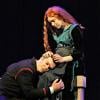
Of all the works in the standard operatic repertory, perhaps only the libretto and music of Bela Bartók’s Bluebeard’s Castle (1911–1917) are as mysterious as those of Claude Debussy’s Pelléas et Mélisande (1901). Both operas are based on plays by Maurice Maeterlinck, but where Bartók’s one-act masterpiece remains firmly anchored in sadism and subservience, Debussy’s longer five-act groundbreaker remains in the shadows from its opening scene to its conclusion. Bluebeard’s true nature is eventually revealed, but Mélisande remains forever shrouded in mystery.
Which is not to say that Pelléas et Mélisande lacks in suspense and drama. Quite the opposite. The drama and colors are so intense in Harmonia Mundi’s new period-instrument recording of the opera with François-Xavier Roth’s Les Siècles that, even without the visuals (which, in modern productions, occasionally detract from the music), the performance is riveting from first note to last. I do not exaggerate when I say that I could barely catch my breath in the final scenes of Roth’s recording.
Roth consistently keeps his orchestra flowing but in check. Only once, when Pelléas and Mélisande’s lips unite right before Golaud reveals himself, does the orchestra threaten to cover the singers. The effect is intentional; it is the one moment in the opera where the three main characters are all so swept up in their fate that all sense of hope vanishes. Otherwise, Roth leaves us so reveling in the instrumental sonorities that every note the characters sing — every unspoken thought and feeling — is pregnant with meaning.
The singing is virtually as fine as the conducting. In tenor Julien Behr, Roth has found a Pelléas with a voice so light, sweet, innocent, and passionate as to rival the best on record. Opera lovers enamored of Roger Désormière’s famed 1941 recording with high baritone Jacques Jansen as Pelléas will find in Behr a kindred spirit.

All the other men are equally strong. As brutal as baritone Alexandre Duhamel can sound as Golaud, his tenderness in the final scene is heartbreaking. Ditto for the genuinely fatherly and wise-sounding bass Jean Teitgen as Arkel. Boy soprano Hadrien Joubert is as touching as can be as little Yniold, and bass-baritone Damien Pass (Le Médecin) and bass Mathieu Gourlet (Un berger) are fine in their supporting roles.
Mezzo Marie-Ange Todorovitch is quite good as Geneviève, the mother whose curious disappearance after the first act leaves Mélisande adrift in a world of men. Only soprano Vannina Santoni disappoints in the crucial role of Mélisande.
Think back to some of the great Mélisandes of the past, starting with role originator Mary Garden. Even in primitive acoustic sound, Garden, accompanied by Debussy on piano in 1904, sounds so fetchingly innocent and pure at the top of her range, and so mysterious farther down as to explain why Debussy embraced the Scottish soprano as “my Mélisande.” His second Mélisande, Maggie Teyte, had a lower range so shrouded in sadness, and highs so pure and fragile, as to prove equally ideal for the role. (If only she had not waited until her late 50s to record a few excerpts from the opera.) Désormière’s Irène Joachim also captures Mélisande’s essential sadness and fragility, as does one of the most beloved modern interpreters, high mezzo Frederica von Stade. The hollow quality of Flicka’s low range is perfect for the role.
Santoni has a fine voice, but it lacks Mélisande’s essential mystery and sadness. When she wakes in the final act, her soft singing is deeply touching; elsewhere, the voice lacks a timbre uniquely its own. As much as we may never know who Mélisande is, we do know that she is never other than her hidden self. As hard as I tried, I could never find anything truly distinctive about Santoni’s voice and interpretation that cloaked Mélisande in mystery.
Nonetheless, I urge you to audition this recording. If you’re a Pélleas lover, you will most likely want to add it to your collection. Despite its one drawback, it is so lovingly conducted and beautifully sung as to make it an essential supplement to whatever recordings you already own. The libretto in the booklet that accompanied the wonderful-sounding hi-resolution (24/96) files I auditioned alternated French on one page with English and German together on the next, but almost everyone’s diction is so exemplary that not having French and English side-by-side will prove no impediment for someone with even a rudimentary understanding of the French language. Highly recommended.





